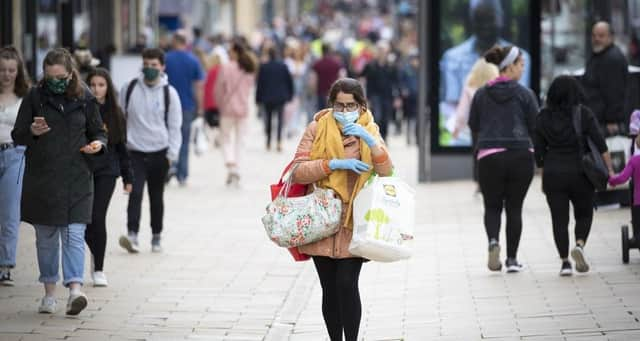Retail sales for 2020 at record low


Physical non-food stores – including all of ‘non-essential’ retail – saw sales drop by a quarter last year compared with 2019, according to new data from the British Retail Consortium. Retail experts warned that Christmas had offered “little respite” for retailers, due to many shops being forced to shut during the peak trading period.
Total sales declined 0.3 per cent compared with 2019 driven by a decline in non-food items of 5 per cent for the year. Food sales, however, grew by 5.4 per cent. Over the three months to December, in-store sales of non-food items declined 24.7 per cent on a total basis and 14.4 per cent on a like-for-like basis – including only stores that had been open for more than a year.
Advertisement
Hide AdAdvertisement
Hide AdHelen Dickinson, chief executive of the British Retail Consortium, said: “Covid has led to 2020 being the worst year on record for retail sales growth. Physical non-food stores – including all of ‘non-essential’ retail – saw sales drop by a quarter compared with 2019. Christmas offered little respite for these retailers, as many shops were forced to shut during the peak trading period. Though this led to a rise in food-based gifts as many shoppers bought what they could from the shops that were still open.
“With shops still closed for the foreseeable future, costing stores billions in lost sales, many retailers are struggling to survive. To avoid the unnecessary loss of shops and jobs Government should announce an extension to business rates relief for the worst-affected businesses as soon as possible. With many retailers making decisions over their future, the Government must act decisively.”
However, December saw a 1.8 per cent growth in sales overall – including online - bolstered by the fact that those still in work had money to spend due to a lack of opportunity to spend on travel or leisure in the period. However, in-store spending on non-food items declined by almost a quarter in the three months to December, usually the busiest time of year for shops.
Paul Martin, UK head of retail at KPMG, which co-authored the report, said: “In the most important month for the retail industry, there was some positive growth due to the on-going shift of expenditure from other categories such as travel and leisure. Once again we saw big swings in the types of products being purchased and the channels used for shopping, with much of the growth taking place online where nearly half of all non-food purchases were made. Household related and food item purchases were top of Christmas shopping lists with historic growth rates in contrast to fashion, accessories and beauty products which experienced double-digit declines.
“Further restrictions and the closure of many non-essential shops resulted in a dismal December performance for those retailers on the high street and conditions will continue to be challenging as we enter another national lockdown. Consumer behaviour will also continue to evolve and retailers must embrace the changes if they are to hold on to hard won customers and generate profitable sales.”